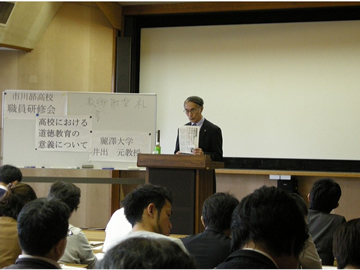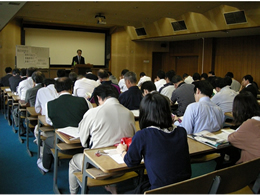A Lecture Given by Professor Ide, Assistant to the President of Reitaku University, at a Workshop for Members of Staff at Chiba Prefectural Ichikawa Subaru Senior High School

On Tuesday, October 23, 2012, Professor Ide, Assistant to the President of Reitaku University, lectured on the topic of moral education at a workshop for members of staff at Chiba Prefectural Ichikawa Subaru Senior High School (Principal: Mr. Shibata). The Center for Moral Science and Education’s decision to offer such external lectures was taken in response to requests from schoolteachers seeking to think more deeply about the kinds of classes they should develop now that morality is to become a compulsory subject at high schools in Chiba Prefecture. This development was also the reason for the publication by the Center of its Moral Textbook for High School Students in 2013.
Ichikawa Subaru Senior High School organized workshops on moral education for members of staff in October and December, 2012, the theme of the first of these being “the meaning of moral education in high schools.”
Professor Ide opened his talk by remarking that in considering “the meaning of moral education in high schools and in a narrow and a broader sense”, we need to think about equipping ourselves with a form of morality that is valid for our relationships with other people and society at large, since this is the purpose of knowledge in general and moral education in particular. As a result, moral education has two aspects: one (the narrow definition of the term) involves teaching the subject of ‘morality’ in classrooms; the second, and broader sense of the term, includes things like extracurricular activities, everyday conversations with students and so on, a 24 hour a day form of education. One can formally instruct students about aspects of the subject of morality such as the effects of moral practice and universal morality using examples from daily life in classes on “morality”. But Professor Ide contended that it is also possible to educate them outside the classroom during extracurricular activities and in daily life, to nurture their human abilities through practice, and to develop a rich humanity in them. He described how this could be done by citing as examples the writings of students at Reitaku University who participate in a seminar about leadership.
Professor Ide concluded by stressing the importance for the practice of moral education of discerning the characters of students through the various stages of their growth, of being attentive to subtle changes in their essence, of utilizing the results of teachers’ own studies, of teachers reflecting on their own experiences in conversation with students, and of recognizing that “Master and pupil learn together”.
About 60 teachers and staff members of the high school listened attentively to the lecture, which was followed by a question and answer session.




